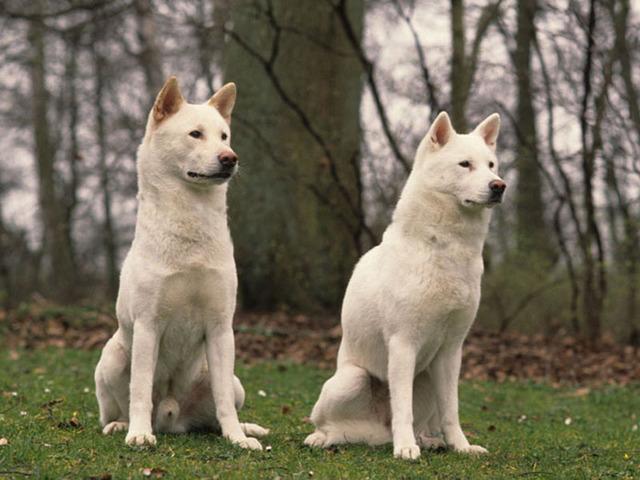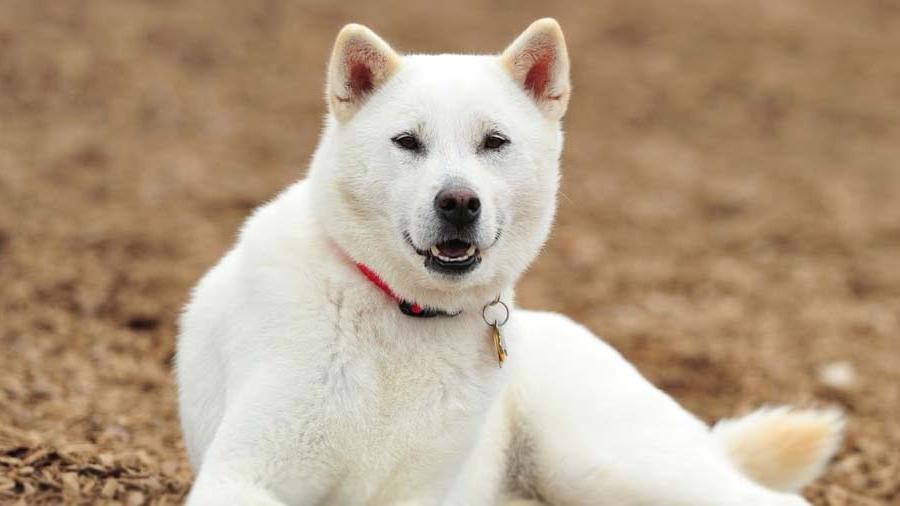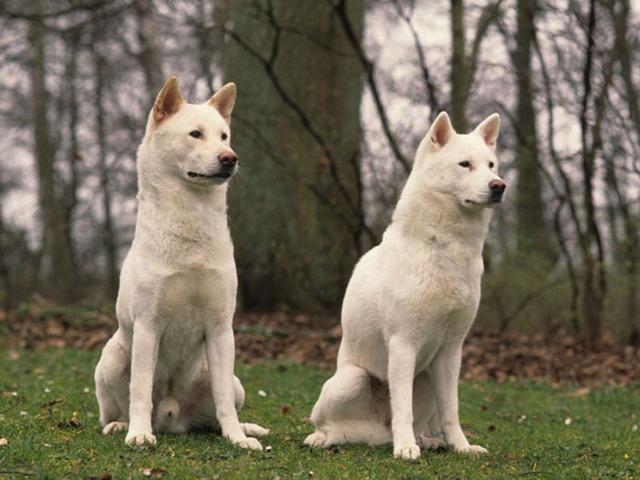- Breed Category: Working Group
- Country of Origin: Japan
- Average Height: Males 49-55 cm, Females 46-52 cm
- Average Weight: Males 18-27 kg, Females 15-23 kg
- Average Life Span: 11-13 years
- Grooming Requirements: Low, occasional brushing
- Exercise Requirements: High, needs daily exercise
- Coat Type: Short, dense double coat
- Coat Color Variations: White, red, sesame
- Shedding Level: Moderate
- Ear Type: Erect
- Tail Type: Curled over back
- Temperament: Loyal, reserved, independent
- Intelligence Level: High
- Barking Tendency: Low
- Compatibility with Children: Good with proper socialisation
- Compatibility with Other Pets: May be aloof, needs socialisation
- Training Ease: Moderate, requires patience
- Common Health Issues: Hip dysplasia, allergies
- Dietary Needs: High-quality dog food recommended
- Energy Level: High
- Drooling Tendency: Low
- Sensitivity to Weather: Tolerates cold well
- Overall Maintenance Level: Moderate
- Original Purpose: Hunting boar and deer
- Year of Recognition by Kennel Clubs: 1934 (Japan)
- Apartment Friendly: Not ideal, needs space
- Best Suited For: Active families, rural settings
- Cost of Ownership: Moderate to high
- Unique Traits: Strong prey drive, loyal nature
- Cultural Significance: National treasure of Japan
Choosing the right dog breed can be a bit of a puzzle, especially when you’re looking for a loyal companion that fits your lifestyle. Enter the Kishu dog, a breed that might just tick all the boxes. Known for their loyalty and intelligence, Kishu dogs are a fascinating blend of history and character. This article aims to shed light on their unique traits, rich history, and how best to care for them.
The Kishu dog hails from Japan, with roots tracing back over a thousand years. Originally bred for hunting, these dogs are known for their courage and determination. Their history is as intriguing as their personality, making them a breed worth getting to know.
The Kishu Dog: A Glimpse into Its Origins and Characteristics

Early Development of the Breed
The Kishu dog has a storied past, with its origins deeply embedded in the mountainous regions of Japan. This breed was developed over centuries, primarily in the Kishu region, which is now part of modern-day Wakayama and Mie Prefectures. The rugged terrain of these areas played a crucial role in shaping the Kishu’s physical and behavioural traits, making them adept hunters and loyal companions.
Role in Japanese Hunting Traditions
Traditionally, Kishu dogs were used for hunting boar and deer. Their keen sense of smell and silent tracking abilities made them invaluable to hunters. Unlike other breeds that might bark to alert their owners, Kishu dogs are known for their stealth, approaching prey with a quiet determination that speaks to their intelligence and focus.
Key Historical Figures and Regions
The breed’s development is closely linked to the Kishu region, with local hunters and breeders playing pivotal roles in refining their traits. Over time, the Kishu dog became a symbol of the region’s rich hunting culture, celebrated for its resilience and loyalty.
Physical Characteristics
Physically, Kishu dogs are medium-sized with a strong, muscular build. Their coats are typically short and dense, often in shades of white, red, or sesame. Their almond-shaped eyes and erect ears give them an alert and intelligent expression, while their curled tails add a touch of elegance to their robust appearance.
Appearance and Unique Traits
The Kishu dog stands out with its medium size and athletic build, perfectly suited for its historical role as a hunter. Its coat is short and dense, coming in shades of white, red, or sesame, which not only adds to its striking appearance but also provides protection against the elements. One of the most distinctive features of the Kishu is its curled tail, which elegantly arches over its back, adding a touch of grace to its robust physique.
Another notable trait is their almond-shaped eyes, which convey an alert and intelligent expression. This, combined with their erect ears, gives the Kishu a look of constant attentiveness, always ready to spring into action.
Temperament and Behaviour
When it comes to temperament, Kishu dogs are known for their loyalty and intelligence. They form strong bonds with their families and are often reserved with strangers, making them excellent watchdogs. Despite their hunting background, they are calm and composed at home, displaying a quiet confidence that is both reassuring and endearing.
These dogs thrive on mental and physical stimulation, so regular exercise and engaging activities are essential to keep them happy and healthy. Their independent nature means they can be a bit stubborn, but with consistent training, they become obedient and well-mannered companions.
Typical Personality Traits
Kishu dogs are renowned for their loyalty and intelligence. They form deep bonds with their families, often showing a reserved nature around strangers. This makes them excellent watchdogs, always alert and protective. Despite their hunting heritage, they maintain a calm demeanour at home, exuding a quiet confidence that is both reassuring and charming.
Suitability as a Family Pet and Hunting Companion
As family pets, Kishu dogs are a great fit for those who appreciate a loyal and intelligent companion. Their hunting instincts make them ideal for active families who enjoy outdoor activities. They are versatile, adapting well to both family life and the demands of a hunting partner.
Interaction with Children and Other Animals
Kishu dogs generally interact well with children, displaying patience and gentleness. However, early socialisation is key to ensuring they are comfortable around other animals. Their natural hunting instincts mean they may have a strong prey drive, so supervision is recommended when introducing them to smaller pets.
Training and Exercise Needs
These dogs thrive on mental and physical stimulation. Regular exercise is crucial, as is engaging their minds with training and interactive play. While they can be independent and sometimes stubborn, consistent training helps them become obedient and well-mannered companions. A mix of activities keeps them happy and healthy, making them a joy to have around.
Training, Exercise, and Health of the Kishu Dog

Importance of Early Training and Socialisation
Getting a Kishu dog off to a good start with early training and socialisation is crucial. These dogs are naturally intelligent and loyal, but they can be a bit reserved. Introducing them to different people, environments, and other animals early on helps them grow into well-rounded adults. This early exposure is key to ensuring they are comfortable and confident in various situations.
Recommended Training Techniques
When it comes to training, consistency is your best friend. Positive reinforcement works wonders with Kishu dogs. They respond well to rewards and praise, making training sessions enjoyable for both of you. Keep the sessions short and engaging to hold their attention, and you’ll find they learn quickly.
Daily Exercise Requirements and Activities They Enjoy
Kishu dogs are active and need regular exercise to stay happy and healthy. Daily walks, playtime, and mental challenges are essential. They love activities that engage their minds, like puzzle toys or agility training. A good run in a secure area is also a favourite, tapping into their natural hunting instincts.
Health and Lifespan
Generally, Kishu dogs are healthy, with a lifespan of around 11 to 13 years. Regular vet check-ups, a balanced diet, and plenty of exercise contribute to their well-being. Like any breed, they can be prone to certain health issues, so keeping an eye on their health and seeking advice from your vet is always a good idea.
Health and Care for the Kishu Dog

Common Health Issues
Kishu dogs are generally healthy, but like any breed, they can be prone to certain health issues. Hip dysplasia and allergies are among the more common concerns. Regular vet check-ups can help catch these early, ensuring your Kishu stays in top shape.
Average Lifespan and Health Tips
With proper care, Kishu dogs typically live between 11 to 13 years. To keep them healthy, provide a balanced diet, regular exercise, and mental stimulation. These elements are crucial for their overall well-being and longevity.
Preventative Care Recommendations
Preventative care is key to a healthy Kishu. Regular vaccinations, flea and tick prevention, and dental care are essential. Routine vet visits will help monitor their health and address any issues before they become serious.
Grooming and Maintenance
Kishu dogs have a short, dense coat that requires minimal grooming. A weekly brush will help keep their coat healthy and reduce shedding. Regular nail trimming and ear cleaning are also important to prevent infections and maintain overall hygiene.
Coat Care and Grooming for the Kishu Dog

Coat Care and Grooming Routines
The Kishu dog boasts a short, dense coat that’s relatively low-maintenance. A weekly brush is usually enough to keep their coat looking its best and to remove loose hair. This routine not only helps with shedding but also keeps their skin healthy by distributing natural oils. Regular grooming sessions are a great opportunity to check for any skin issues or parasites.
Shedding and Seasonal Grooming Tips
While Kishu dogs don’t shed excessively, they do experience seasonal shedding, typically in spring and autumn. During these times, more frequent brushing can help manage the extra hair. A slicker brush or a grooming mitt can be particularly effective in removing loose fur and keeping your home fur-free.
Diet and Nutrition
A balanced diet is crucial for the Kishu’s overall health and well-being. High-quality dog food that meets their nutritional needs is essential. Look for options rich in protein and healthy fats to support their active lifestyle. Fresh water should always be available, and treats should be given in moderation to prevent weight gain. Consulting with a vet can help tailor a diet plan that suits your Kishu’s specific needs.
Nutritional Needs and Feeding for the Kishu Dog
Nutritional Needs for Optimal Health
For a Kishu dog, a balanced diet is key to maintaining their health and vitality. High-quality dog food that is rich in protein and healthy fats supports their active lifestyle. Look for foods that include lean meats, fish, and whole grains. These ingredients provide essential nutrients and energy.
Foods to Include and Avoid
Include foods like chicken, beef, and fish, which are excellent protein sources. Vegetables like carrots and spinach can also be beneficial. Avoid foods high in fillers, artificial additives, and excessive grains, as these can lead to allergies or digestive issues.
Feeding Schedules and Portion Recommendations
Feed your Kishu twice a day, once in the morning and once in the evening. Portion sizes depend on their age, weight, and activity level, so consult your vet for specific recommendations. Always ensure fresh water is available.
Fun Facts and Trivia
Did you know that the Kishu dog is one of Japan’s national treasures? Their loyalty and hunting prowess have been celebrated for centuries. Despite their hunting background, they are known for their quiet nature, rarely barking without reason.
Interesting Tidbits and Famous Kishu Dogs

Interesting Tidbits about the Kishu Breed
The Kishu dog is a fascinating breed with a rich history. Did you know that they are one of the six native Japanese spitz-type dogs? Their lineage is so esteemed that they were designated as a “Natural Monument” in Japan in 1934. This recognition highlights their cultural significance and the pride the Japanese people have in this breed.
Another interesting fact is their unique hunting style. Unlike many hunting dogs, Kishu dogs are known for their silent approach. This stealthy behaviour made them exceptional hunters, especially when tracking boar and deer in the dense forests of Japan. Their ability to move quietly and with purpose is a testament to their intelligence and adaptability.
Famous Kishu Dogs in Media or History
While the Kishu dog may not be as widely recognised in media as some other breeds, they have made their mark in history. One notable Kishu was owned by the famous Japanese author Yukio Mishima. Mishima’s admiration for the breed was evident, and he often spoke of their loyalty and noble character.
In recent years, the Kishu has gained popularity in various dog shows around the world, showcasing their elegance and poise. Their presence in these events has helped raise awareness of the breed, introducing their unique qualities to a broader audience.
Final Thoughts
The Kishu dog is a loyal and intelligent companion. With its rich history and unique traits, this breed offers both challenges and rewards for dedicated owners. Their independent nature and strong prey drive require patience and understanding, but the bond formed is deeply rewarding. Embracing the Kishu’s needs for exercise and mental stimulation ensures a fulfilling relationship. Consider welcoming a Kishu into your life if you seek a devoted and spirited partner.
